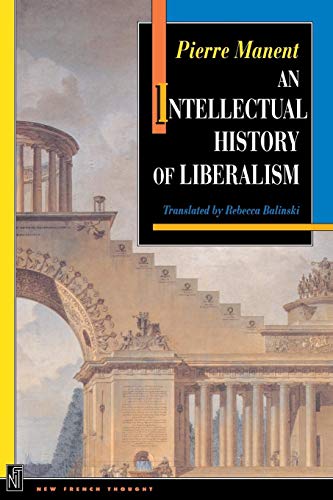Verwandte Artikel zu An Intellectual History of Liberalism: 3 (New French...

Inhaltsangabe
Highlighting the social tensions that confront the liberal tradition, Pierre Manent draws a portrait of what we, citizens of modern liberal democracies, have become. For Manent, a discussion of liberalism encompasses the foundations of modern society, its secularism, its individualism, and its conception of rights. The frequent incapacity of the morally neutral, democratic state to further social causes, he argues, derives from the liberal stance that political life does not serve a higher purpose. Through quick-moving, highly synthetic essays, he explores the development of liberal thinking in terms of a single theme: the decline of theological politics. The author traces the liberal stance to Machiavelli, who, in seeking to divorce everyday life from the pervasive influence of the Catholic church, separated politics from all notions of a cosmological order. What followed, as Manent demonstrates in his analyses of Locke, Hobbes, Rousseau, Guizot, and Constant, was the evolving concept of an individual with no goals outside the confines of the self and a state with no purpose but to prevent individuals from dominating one another. Weighing both the positive and negative effects of such a political arrangement, Manent raises important questions about the fundamental political issues of the day, among them the possibility of individual rights being reconciled with the necessary demands of political organization, and the desirability of a government system neutral about religion but not about public morals.
Die Inhaltsangabe kann sich auf eine andere Ausgabe dieses Titels beziehen.
Über die Autorin bzw. den Autor
Pierre Manent is director of studies at the Ecole des Hautes Etudes en Sciences Sociales in Paris and coeditor of the journal La Pensée politique.
Von der hinteren Coverseite
Highlighting the social tensions that confront the liberal tradition, Pierre Manent draws a portrait of what we, citizens of modern liberal democracies, have become. Through quick-moving, highly synthetic essays, he explores the development of liberal thinking in terms of a single theme: the decline of theological politics.
„Über diesen Titel“ kann sich auf eine andere Ausgabe dieses Titels beziehen.
Gratis für den Versand innerhalb von/der USA
Versandziele, Kosten & DauerNeu kaufen
Diesen Artikel anzeigenEUR 7,46 für den Versand von Vereinigtes Königreich nach USA
Versandziele, Kosten & DauerSuchergebnisse für An Intellectual History of Liberalism: 3 (New French...
An Intellectual History of Liberalism
Anbieter: ThriftBooks-Atlanta, AUSTELL, GA, USA
Paperback. Zustand: Very Good. No Jacket. May have limited writing in cover pages. Pages are unmarked. ~ ThriftBooks: Read More, Spend Less. Artikel-Nr. G0691029113I4N00
Anzahl: 1 verfügbar
An Intellectual History of Liberalism
Anbieter: Better World Books, Mishawaka, IN, USA
Zustand: Good. Used book that is in clean, average condition without any missing pages. Artikel-Nr. 5344057-6
Anzahl: 1 verfügbar
An Intellectual History of Liberalism
Anbieter: Majestic Books, Hounslow, Vereinigtes Königreich
Zustand: New. pp. 146. Artikel-Nr. 8063477
Anzahl: 1 verfügbar
An Intellectual History of Liberalism (Paper)
Anbieter: Revaluation Books, Exeter, Vereinigtes Königreich
Paperback. Zustand: Brand New. reprint edition. 142 pages. 9.50x6.25x0.50 inches. In Stock. Artikel-Nr. x-0691029113
Anzahl: 2 verfügbar
An Intellectual History of Liberalism
Anbieter: Kennys Bookstore, Olney, MD, USA
Zustand: New. Highlighting social tensions that confront the liberal tradition, this book draws a portrait of what we, citizens of modern liberal democracies, have become. It argues that the frequent incapacity of the morally neutral, democratic state to further social causes derives from the liberal stance that political life does not serve a higher purpose. Translator(s): Balinski, Rebecca. Series: New French Thought Series. Num Pages: 142 pages, black & white illustrations. BIC Classification: JFCX; JPFK. Category: (P) Professional & Vocational; (U) Tertiary Education (US: College). Dimension: 234 x 156 x 10. Weight in Grams: 218. . 1996. Reprint. Paperback. . . . . Books ship from the US and Ireland. Artikel-Nr. V9780691029115
Anzahl: Mehr als 20 verfügbar

